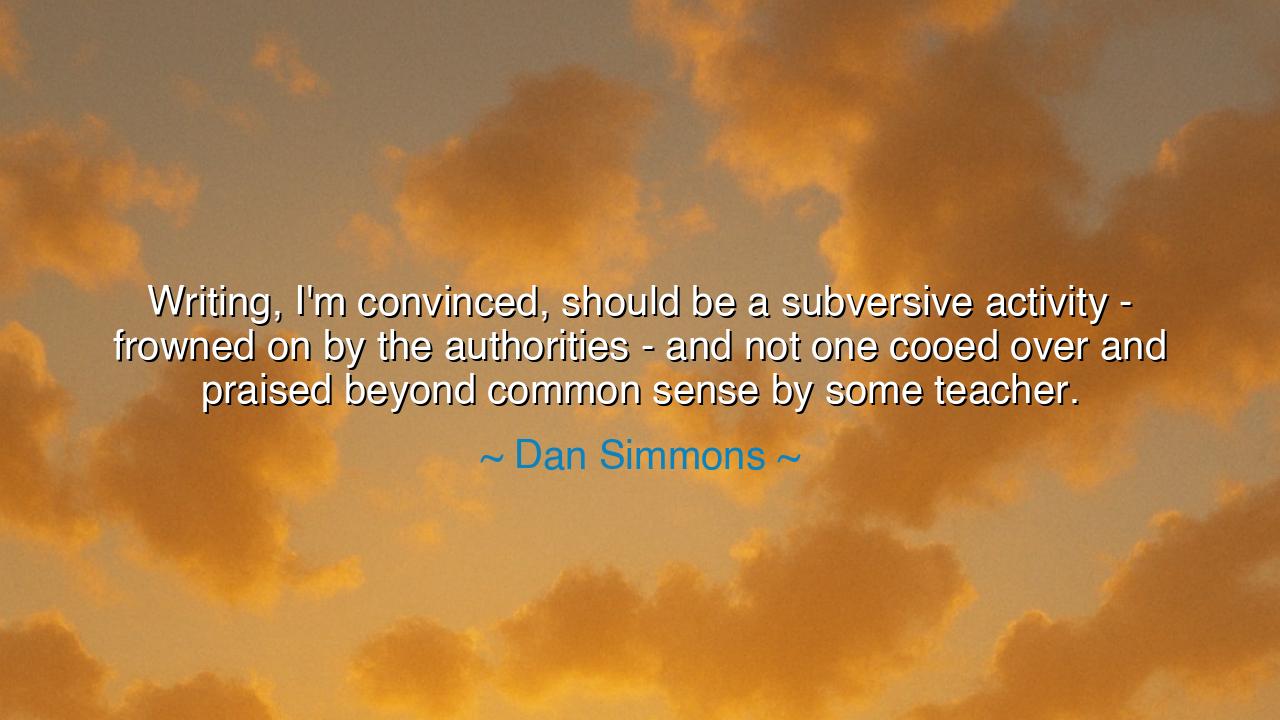
Writing, I'm convinced, should be a subversive activity -
Writing, I'm convinced, should be a subversive activity - frowned on by the authorities - and not one cooed over and praised beyond common sense by some teacher.






The words of Dan Simmons—“Writing, I'm convinced, should be a subversive activity—frowned on by the authorities—and not one cooed over and praised beyond common sense by some teacher”—strike like a clarion call from the shadows of thought. Here is the declaration that writing is not merely a task to be applauded, but a weapon, a lantern, and a mirror of the unseen. It is meant to challenge, to question, to pierce the veil of complacency that those in power weave around the minds of men and women. To be fawned over for writing, without the sting of resistance, is to dilute its sacred potency.
The meaning of Simmons’ teaching is that true writing is subversive by nature, for it speaks truths that may disturb comfort, reveal contradictions, and illuminate hidden injustices. When words are censured or frowned upon by the powerful, it is often a sign that they bear the fire of authenticity. Conversely, when writing is excessively praised or blindly celebrated by authorities or educators, it risks becoming an instrument of conformity, stripped of its capacity to provoke thought and awaken souls. The writer’s task, therefore, is to embrace danger, not applause, in service of truth.
History offers countless examples of this principle. Consider Voltaire, who wielded his pen against kings, clergy, and corrupt institutions. He faced imprisonment and exile, yet in daring to subvert the authorities of his age, he illuminated reason, freedom, and the dignity of thought. His writings were not meant to be cooed over in classrooms—they were meant to shake the foundations of accepted belief, challenging the complacent to see the world anew. Simmons’ insight echoes Voltaire’s life: writing loses its vitality when it is only a tool for praise.
Similarly, the words of George Orwell reverberate with this same truth. In 1984 and Animal Farm, he did not seek the approval of the powerful, but instead exposed the mechanisms of control, surveillance, and deceit. Authorities bristled, regimes censored, and yet the writings endured, carrying their subversive force across generations. Writing that is not subversive is like a sword dulled before battle; writing that confronts, that challenges, carries the timeless power to awaken minds.
The lesson for us, O seekers of wisdom, is that the act of creation is inseparable from courage. To write, to speak, to make art, is to risk the disapproval of those who cling to comfort and power. Praise from teachers, peers, or authorities may be sweet, but it should never substitute for the bold confrontation with truth. Real writing, real art, seeks not validation but awakening; it exists to challenge, disturb, and illuminate the hidden truths of existence.
Practically, this means that those who write or create must cultivate both honesty and fearlessness. Do not seek approval alone. Examine the world with piercing eyes and unflinching resolve. Allow your words to confront injustice, hypocrisy, or complacency. Even if censured, criticized, or misunderstood, recognize that such resistance is often a sign that your work carries the flame of subversion, a flame meant to burn through illusions and awaken thought.
Thus let it be inscribed upon the scrolls of memory: the purpose of writing is not comfort, nor idle praise, nor the cooing approval of teachers. It is to shake foundations, illuminate darkness, and awaken the slumbering mind. Dan Simmons reminds us that the pen is at once weapon and lantern, and that its true power lies in its capacity to subvert, to challenge, and to reveal the truths that others seek to obscure.






AAdministratorAdministrator
Welcome, honored guests. Please leave a comment, we will respond soon